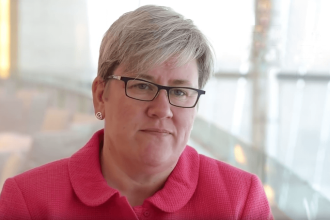By Lenah Bosibori
The Africa Centres for Disease Control and Prevention (Africa CDC) has urged its member states to embrace Mpox vaccinations as the number of cases continues to rise with the latest data showing a significant increase compared to the same period last year.
Speaking on Thursday during a webinar on a special briefing on Mpox in Africa, Dr Jean Kaseya Director General of the Africa CDC said since the beginning of this year, a total of 29,152 cases of which 6,105 were confirmed and 738 deaths were reported from 15 African Member States.
“Mpox is not under control in Africa. We are seeing a continuous rise in cases, with a 177% increase in cases and a 38.5% increase in deaths compared to the same time in 2023,” Dr Kaseya said.
In addition, Dr Kaseya noted that there has been an upward trend in the number of Mpox cases reported since week 18 (May 2024), in one week, we had 2912 new cases, compared to the previous year, we also lost 14 people in one week and death due to Mpox is a serious death that we need to say enough is enough,” said Kaseya.
According to Kaseya, Mpox vaccination has already started in Rwanda. “We began vaccinations in Rwanda two days ago. So far, around 500 people have been vaccinated, and about 1,000 doses have been administered. However, the country requires more than the 10,000 doses it had initially requested,” said Kaseya.
By the end of epidemiological week 36 of 2024, more than 2,900 new Mpox cases were reported, representing a significant increase from the previous year. There were 374 new confirmed cases in week 35 alone, along with 14 deaths. Of the confirmed cases, 63% were male, and children below 15 years accounted for 41%.
In addition, Dr Kaseya said Africa requires an estimated 10 million doses of Mpox vaccines. “Our team is working with countries to update their vaccination plans. We are committed to ensuring Africa gets the 10 million doses needed to protect our people,” Dr Kaseya stated.
He also added that the Bavarian Nordic vaccine has been recognized as safe after passing World Health Organization (WHO) prequalification. “The vaccine will further be procured by UNICEF, Gavi, and other partners for distribution to African countries,” reiterated Dr Kaseya.
He also noted that in addition to the Bavarian Nordic vaccine, Japan has also pledged 3 million doses to Africa that will be donated first to the Democratic Republic of the Congo (DRC). “The vaccination campaign in the DRC is expected to begin in the first week of October,” Dr. Kaseya added.
Africa CDC will also allocate additional vaccine doses to countries such as Rwanda, South Africa, and Uganda according to Dr Kaseya. “The organization is establishing a technical review committee of African experts to assist countries in developing strong vaccination campaign plans to curb the spread of Mpox,” added Dr Kaseya.
To further support member states, Africa CDC has produced 28,000 Mpox test kits, including GeneXpert cartridges, which are being distributed to affected or at-risk countries. “We are also training laboratory experts to enhance their testing capabilities and ensure accurate reporting,” Kaseya noted.
However, Dr Kaseya noted that one of the major challenges African CDC faces is low testing rates due to issues in sample collection and transportation. “We are supporting countries to reduce this burden, and we expect testing rates to improve over the next two weeks with the necessary support,” said Dr Kaseya.
Another critical issue is cross-border surveillance, which remains weak due to the lack of a rapid antigen test. Africa CDC is working to strengthen surveillance capacity, particularly at border crossings, by focusing on health workers according to Dr Kaseya.
Additionally, the Africa CDC has highlighted the importance of African countries manufacturing vaccines locally. “We are leading the fight to ensure Africa can produce its vaccines. We have 26 partners working together to strengthen this mechanism and give Africa a fighting chance,” Kaseya emphasized.
“Africa CDC is working closely with manufacturers and partners to ensure Mpox vaccines are produced in African countries. “Young people are particularly affected by this outbreak, with 41% of cases being among children under 15 years old,” Kaseya said.
Morocco has recently become the latest African country to report Mpox cases, bringing the total number of affected countries to 15. “In the DRC, we are seeing different clades of the virus, making it difficult to predict what will happen next. Ongoing studies aim to understand how this impacts our fight against the outbreak,” Kaseya explained.
Key risk factors for the spread of Mpox include cross-border movement, malnutrition, and unsafe sexual practices. Clade 1b of the virus has been identified in countries such as the DRC, Burundi, Kenya, Uganda, and Rwanda.
In the coming days, the Africa CDC will allocate vaccines to Rwanda, the Central African Republic, South Africa, Uganda, Burundi, and any other country that will be in need. Additionally, the newly established Technical Review Committee will support countries in integrating micro plans for the vaccination campaign and learning from the use, delivery, and impact of the vaccines.




